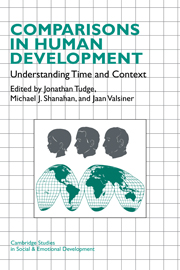Book contents
- Frontmatter
- Contents
- List of Contributors
- Comparisons in Human Development: To Begin a Conversation
- Part One Metatheoretical Approaches to Developmental Comparisons
- Part Two Paradigmatic Statements
- Part Three Comparisons at the Level of Data
- 7 The Co-development of Identity, Agency, and Lived Worlds
- 8 Sociocultural Promotions Constraining Children's Social Activity: Comparisons and Variability in the Development of Friendships
- 9 The Everyday Experiences of North American Preschoolers in Two Cultural Communities: A Cross-disciplinary and Cross-level Analysis
- Part Four Commentaries
- Author Index
- Subject Index
8 - Sociocultural Promotions Constraining Children's Social Activity: Comparisons and Variability in the Development of Friendships
Published online by Cambridge University Press: 04 May 2010
- Frontmatter
- Contents
- List of Contributors
- Comparisons in Human Development: To Begin a Conversation
- Part One Metatheoretical Approaches to Developmental Comparisons
- Part Two Paradigmatic Statements
- Part Three Comparisons at the Level of Data
- 7 The Co-development of Identity, Agency, and Lived Worlds
- 8 Sociocultural Promotions Constraining Children's Social Activity: Comparisons and Variability in the Development of Friendships
- 9 The Everyday Experiences of North American Preschoolers in Two Cultural Communities: A Cross-disciplinary and Cross-level Analysis
- Part Four Commentaries
- Author Index
- Subject Index
Summary
Introduction
… children's friendships exist within a broad ecological, societal, cultural, and historical context which cannot be ignored if we are to attain a satisfactory general understanding of [the development] of friendship in childhood.
(Allen, 1981)The social activities and social relationships of children are selectively promoted by the adult caregivers in the children's social group (Winegar, 1989). These promotions are based on socioculturally and historically constructed preferences and beliefs about the developmental needs of children and the appropriate life goals of members of the particular culture.
One way that sociocultural promotions are made concrete is by the organization and structuring of social settings for children. In this chapter I contend that such promotions of different cultural groups may be contrasted, but that their contrasting natures do not guarantee heterogeneity of children's action or development across cultures. Also, I will demonstrate that within very similar activity settings in one culture, high variability of social relationship development is prevalent. In most psychological and developmental research studies, comparisons are made to point out similarities. However, here I wish to examine developmental systems in which comparisons, both across and within sociocultural groups, tend to affirm individual differences in relationship development. The affirmation of such differences calls into question unidirectional cultural transmission models of social development.
First, I will try to make plain my own metatheoretical orientation, define some key terms, and compare two metatheoretical approaches that guide research into friendship development. Subsequently, I will outline developmental theory that attempts to account for children's active reconstructions of sociocultural promotions.
- Type
- Chapter
- Information
- Comparisons in Human DevelopmentUnderstanding Time and Context, pp. 222 - 251Publisher: Cambridge University PressPrint publication year: 1996



